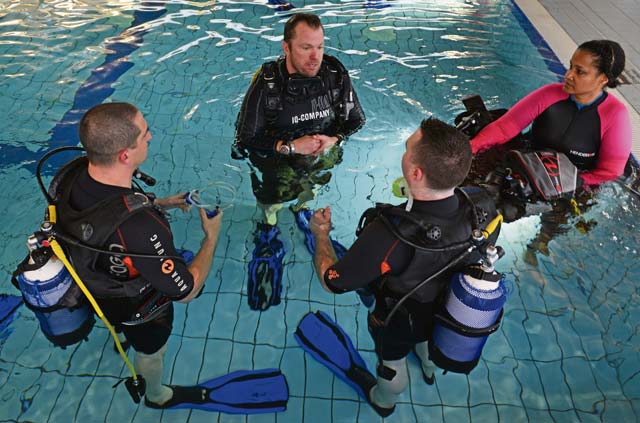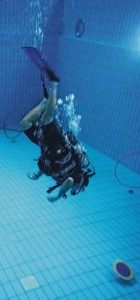
The Wounded Warrior Project teamed up with Ramstein Easy Dive Center at the base aquatic center for an aquatic scuba therapy program to help rebuild resilience and confidence in wounded warriors.
While there are many programs wounded warriors can participate in as a way to recover, one of the more popular means of recovery is scuba diving due to the freedom it provides to the divers.
“We focus on skill building,” said Lt. Col. Sara Custer, chief senior lead management provider. “It helps with their confidence in a weightless environment, which is key in building them back up to be mission capable.”
The program consists of an hourlong class three times a month held in a 25-meter fitness pool kept at temperatures in the 80s, a temperature that keeps things comfortable for the divers and also allows for year-round swimming.
The lessons are taught by certified volunteer divers who offer their time and knowledge in scuba diving as a way to give back to military members.

“It’s nice to see these guys relax after a stressful style of living,” Custer said. “Some of these guys come from a fast-pace or push-through-the-pain career field, and you simply cannot do that with scuba diving. That’s what makes this therapy one of the best ways to assist these warriors, because it helps to calm them down and get them out of warfighter mindset.”
The classes include activities such as underwater hockey, disk tossing and swimming through hoops, all of which help the divers relax and get their minds off anything outside the pool.
“It’s about concentrating on what’s in front of you,” said master scuba diving instructor Mike Johnson. “We can tell when the divers aren’t focused or are distracted by outside influences, because that stress makes them burn up their oxygen reservations quickly. But when we give them simple tasks like breathing underwater for a period of time, they have to put all of their attention into it. It’s a great way to get their heads in the right place.”
The underwater environment also allows wounded warriors to realize how capable they are while allowing their disabilities to become an afterthought as they swim away their stressors and hardships.
The program rebuilds warriors and gives them a newfound confidence in themselves.







